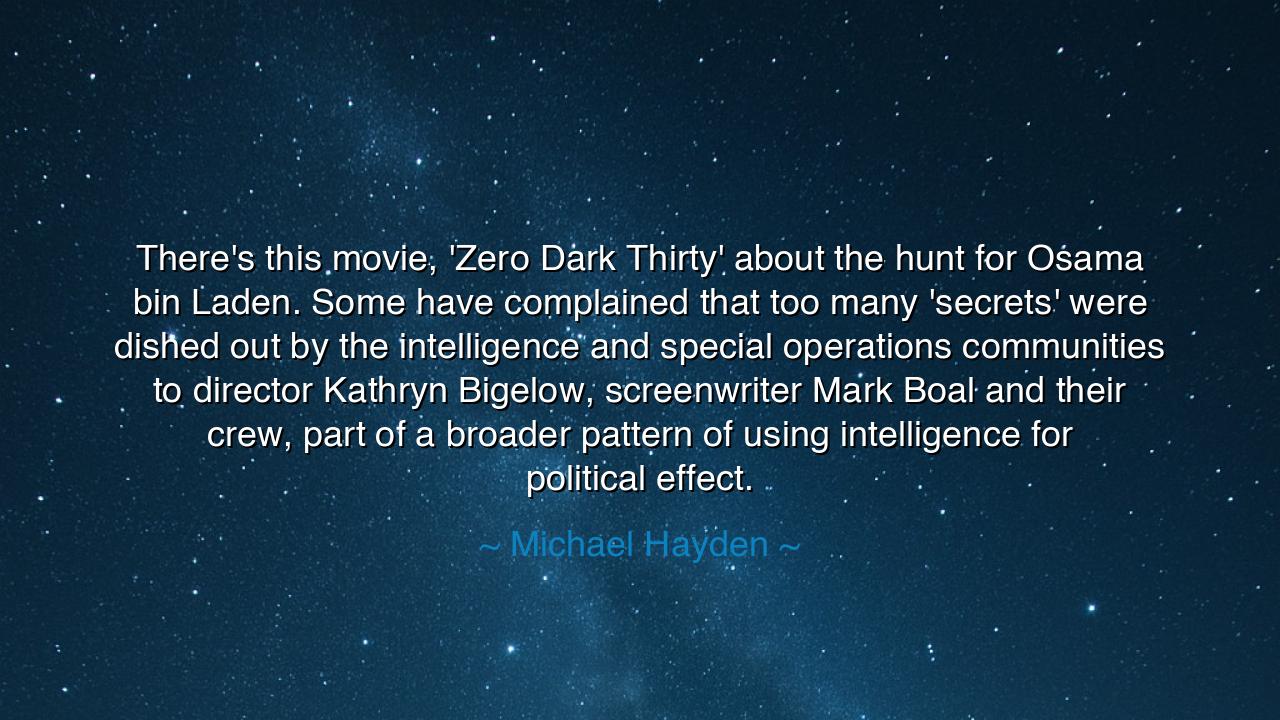
There's this movie, 'Zero Dark Thirty' about the hunt for Osama
There's this movie, 'Zero Dark Thirty' about the hunt for Osama bin Laden. Some have complained that too many 'secrets' were dished out by the intelligence and special operations communities to director Kathryn Bigelow, screenwriter Mark Boal and their crew, part of a broader pattern of using intelligence for political effect.






The words of Michael Hayden, a man who has stood at the helm of the nation’s most secret guardians, strike with the solemn weight of warning: “There's this movie, 'Zero Dark Thirty' about the hunt for Osama bin Laden. Some have complained that too many 'secrets' were dished out by the intelligence and special operations communities to director Kathryn Bigelow, screenwriter Mark Boal and their crew, part of a broader pattern of using intelligence for political effect.” In this reflection, Hayden does not speak merely of a film, nor of controversy, but of the sacred tension between truth and secrecy, between the people’s right to know and a nation’s duty to protect. His words echo through the halls of power and history alike, for every age has wrestled with the same question: how much light can be allowed to shine without blinding the very eyes that seek to see?
Michael Hayden, once Director of the CIA and the NSA, speaks as one who has carried the heaviest burden of silence—the burden of knowing truths that cannot be spoken, dangers that cannot be revealed. When he speaks of “secrets dished out”, he is not merely defending bureaucracy; he is invoking the moral gravity of intelligence, that strange and perilous art through which nations survive. “Zero Dark Thirty,” a film chronicling the ten-year pursuit and death of Osama bin Laden, brought to the public eye a story that had long been whispered about in shadow. Yet Hayden’s concern lies not in art itself, but in the use of knowledge—how truth, when released without care, can be wielded not as enlightenment but as weapon. He warns that when intelligence becomes a tool for political advantage, its sacred purpose—to serve the safety and wisdom of the people—begins to decay.
The tension Hayden describes is ancient. From the earliest days of empire, rulers and sages have guarded their knowledge, for they understood that not all truths can bear the weight of sunlight. The priests of Egypt hid their sciences behind sacred symbols; the generals of Rome concealed their strategies even from their own allies. For knowledge, untempered by wisdom, can turn upon its wielder. The intelligence communities of the modern world are the heirs of this ancient duty: they are the watchers in the dark, who see so that others may live unseeing. Yet Hayden’s lament reveals the tragedy of our age—when secrecy and transparency, once complementary, now clash like rival gods, each demanding worship from the people.
Consider the story of the Manhattan Project, that secret labor of minds which birthed both the triumph of victory and the horror of destruction. When the atomic age dawned, the scientists who had once sworn to silence later struggled with the moral weight of their creation. Some demanded openness—to warn the world of the power they had unleashed. Others, like Oppenheimer, saw that too much truth, too soon, could lead to chaos. Their struggle mirrors the one Hayden describes: the eternal dilemma between revealing truth for the sake of knowledge and concealing it for the sake of peace. For the sword of intelligence, once unsheathed, cannot easily be returned to its scabbard.
What Hayden fears is not the art of cinema, nor the telling of stories, but the erosion of trust—the invisible bond that holds a nation together. When intelligence is used for political effect, when secrets are unveiled to shape opinion rather than to enlighten understanding, the people begin to doubt both their leaders and their protectors. The delicate balance between government and governed begins to tremble. And in that trembling, both liberty and security are endangered. For the strength of any republic depends not only on the courage of its warriors, but on the integrity of its truth-tellers—those who decide what is revealed and what must remain unsaid.
Yet there is wisdom even in Hayden’s caution. He reminds us that knowledge is sacred, and therefore must be handled with reverence. To reveal a secret may seem righteous, but if it endangers the innocent or distorts the truth, it becomes betrayal. To conceal information may seem oppressive, but if it preserves life and order, it becomes duty. The challenge, then, is not to silence truth, but to temper it with discernment. This is the wisdom of the ancients: that truth, like fire, gives light and warmth, but when unbound, consumes all.
Therefore, O seeker of understanding, take this teaching to heart. In your own life, too, there are truths that demand balance. Speak with courage, but also with conscience. Share knowledge not for glory, but for the good of others. Remember that the most powerful wisdom is that which serves life, not vanity. For whether in matters of state or of the soul, the misuse of truth can be as dangerous as the denial of it.
So let Hayden’s warning echo in your heart: use intelligence not for effect, but for enlightenment. Let your words be guided by purpose, your revelations by compassion, and your silence by wisdom. For the light of truth, to be pure, must shine not for spectacle, but for justice—and when that light is wielded with integrity, it becomes not a weapon of politics, but a lamp of peace for generations to come.






AAdministratorAdministrator
Welcome, honored guests. Please leave a comment, we will respond soon